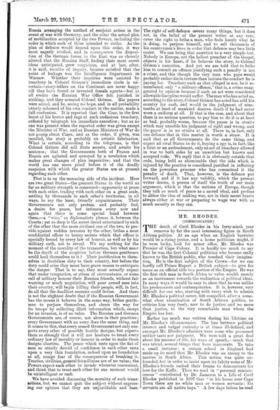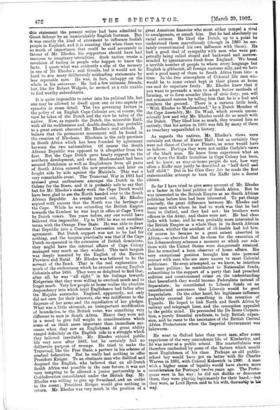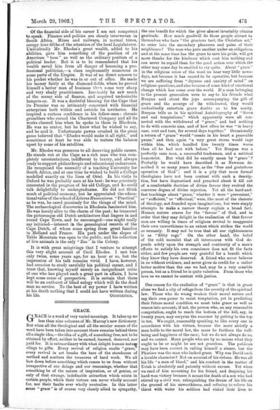MR. RHODES.
[COMILIINICATED.]
THE death of Cecil Rhodes in his forty-ninth year removes by far the most interesting figure in South African politics. At an age when an English barrister would be a rising junior, and a home politician might, if he were lucky, look for minor office, Mr. Rhodes was Premier of Cape Colony. It is hardly too much to say that he was the first Colonial politician who became really known to the British public, who touched their imagina- tion. He is the first subject of the Crown—for we can hardly call Prince Rupert a British subject—to give his name as an official title to a portion of the Empire. He was the first rich man in South Africa to value wealth merely as an instrument towards the realisation of political ideas. In many ways it would. be easy to show that he was unlike his predecessors and contemporaries. It is, however, very difficult for one who, starting with every wish to admire Mr. Rhodes's political career, felt compelled, after a some- what close examination of South African politics, to criticise him very freely, now to do justice, and no more than justice, to the very remarkable man whom the Empire has lost. Rather too much was written during his lifetime on Mr. Rhodes's idiosyncrasies. The line between political interest and vulgar curiosity is at times ill-defined, and amongst Mr. Rhodes's admirers were some who possessed neither taste nor judgment. We were told a great deal about his manner of life, his ways of speech,—much that was trivial, several things that were inaccurate. To take a small instance : a certain school in England had made up its mind that Mr. Rhodes was an enemy to the natives in South Africa. This notion was quite un- founded, but in order to insist upon its falsity some of Mr. Rhodes's friends racked their brains to demonstrate his love for the Kaffir. Thus we read in " personal reminis- cences " contributed. by Dr. Jameson to a Life of Cecil Rhodes published in 1897 that " in his house near Cape Town there are no white men or women servants : his servants are all native boys." A few days before he read this statement the present writer had been admitted to Groot Schuur by an unmistakably English footman. But it was exactly the kind of statement to influence foolish people in England, and it is amazing that when there was so much of importance that could be said accurately in favour of Mr. Rhodes, his supporters should have had recourse to imaginary trivialities. Such tactics create a revulsion of feeling in people who happen to know the facts. I quote what was evidently a slip of the memory in one of Mr. Rhodes's real friends, but it would not be hard to cite many deliberately misleading statements by less reputable men. He was, in fact, unhappy on the whole in his entourage. He had a few intimate friends, but, like Sir Robert Walpole, he seemed as a rule unable to find worthy subordinates.
It is quite impossible to enter into his political life, but one may be allowed to dwell upon one or two aspects or episodes in some detail. 







































 Previous page
Previous page